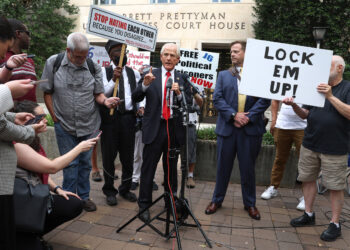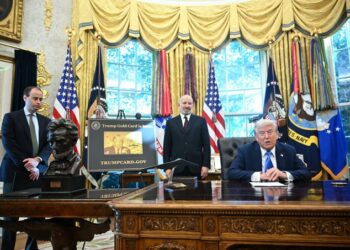In a Saturday WarRoom conversation from Harvard University with Steve Bannon, Ambassador Carla Sands outlined bold steps to revolutionize U.S. foreign policy, cut unnecessary aid, and prepare for a new strategic relationship with Greenland. The discussion, which spanned topics ranging from government corruption to international defense, highlighted Sands’ firm stance on "America First” policies and the country’s national security strategy.
"We’re creating a revolution here at Harvard and across the country, and it’s going to change our nation,” Sands declared.
"This is about America First, and the money will change the money.” Sands emphasized that U.S. taxpayer dollars, often funneled into Ivy League institutions like Harvard and Penn, would no longer serve as a vehicle for bureaucratic corruption. She particularly praised the work of Professor Amy Wax, who has called for reforms using Title VI to examine and address the misuse of federal funds by universities. Sands believes the Department of Education will play a key role in uncovering these financial webs, ultimately redirecting funding to benefit the American people rather than maintaining bloated administrations.
"Corruption, the tens of billions of dollars that are going to places like Penn and Harvard from the federal government, this is all going to change,” Sands affirmed. "We’re going to turn off the money and then we’re going to turn on money that benefits the American people.”
As a former U.S. Ambassador to Denmark, Sands’ extensive knowledge of international relations was evident when discussing the importance of defense in the Arctic region, particularly regarding Greenland. Sands has been a vocal advocate for strengthening U.S. strategic positions in the Arctic, which she describes as a “great power struggle” for the 21st century. She explained that during her tenure, the U.S. had limited defense capabilities in the area, despite the growing military presence of Russia.
"We were outgunned in the Arctic. Russia has around 50 icebreakers, they have missiles on them,” Sands noted. "We have two icebreakers, and one doesn’t always work.” Sands emphasized the strategic importance of Greenland, which is located just off the U.S. Northeast Coast. "Greenland is a third of the size of the continental U.S.,” she explained, "undefended by Denmark and undefended by the U.S.”
A significant topic in the conversation was China’s growing presence in the Arctic, with the CCP laying claim to nearly 40% of the region under the guise of their "Polar Silk Road.” Sands pointed out that while China’s ambitions in the Arctic are clear, the U.S. must assert its presence to maintain its regional role. "We have to be up there,” Sands stated, "because the strategic nature of the Arctic is critical to our national defense.”
Sands’ remarks also touched on the evolving political landscape of Greenland, which she revealed is moving towards potential independence from Denmark—this shift, which Sands attributes to the influence of President Trump’s election. "Greenland is going independent,” Sands stated. "The Premier said about three weeks ago that they’re going independent. That’s a big deal.”
The independence movement is tied to the region’s untapped natural resources, with Sands citing how Denmark has underdeveloped Greenland. The lack of infrastructure and economic development has left Greenland dependent on Denmark’s annual welfare payments. Sands believes that the U.S. can offer the support Greenland needs regarding mining, energy development, and military defense.
While discussing the broader U.S. policy under President Trump’s administration, Sands was enthusiastic about the rapid pace of executive actions and reforms. "Every day’s Christmas,” she said with excitement. "I can’t wait every day, and it doesn’t stop at five o’clock. No, it continues on the weekends. It’s the most exciting political time in my lifetime.”
Sands also addressed the resistance from the media and the left, particularly regarding court challenges to President Trump’s policies. She suggested that reforms should be made to limit the power of individual federal judges who may hinder the president’s ability to carry out his agenda. "I think the judges have to be reined in,” she argued. "The president won the popular vote, he won the Electoral College vote, and the people are behind him.”
About her role, Sands made it clear that she remains committed to serving in whatever capacity President Trump deems necessary. "I’ll do whatever he needs me to do,” she stated. "This is the most exciting time in my life.”
As a prominent figure in U.S. foreign policy, Ambassador Carla Sands’s perspective reflects a powerful commitment to reshaping international relations, strengthening U.S. national defense, and ensuring American taxpayers benefit from foreign investments. As the conversation unfolded, it became evident that her drive for reform remains unwavering at home and abroad.




